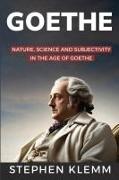NATURE, SCIENCE, AND SUBJECTIVITY IN THE AGE OF GOETHE By Stephen
BücherAngebote / Angebote:
Literary criticism and the history of philosophy have a fairly standard story to tell about the development off German literature and philosophy around 1800. According to this story there were three major movements that cut across literature and philosophy, which, themselves, were always intertwined: Classicsim, Idealism and Romanticism. What all three of these movement have in common, so the story goes, is that they are all reactions to the ground-breaking, epoch shifting philosophy of Immanuel Kant and as such, some version of "Idealism". Matthew C. Altman sums up this position the Palgrave Handbook to German Idealism when he states that, "Kant's "Copernican revolution in philosophy" - the idea that the world must conform to our representation of it, rather than vice versa - inaugurated a movement that philosophers could take up or argue against, but that could not be ignored."1 Kant's shift to Transcendental Idealism, the story goes, set up a constellation of ideas that overturned and delegitimized previous paradigms and to which any intellectual who hoped to maintain relevance had to respond. For Kant's contemporaries, the question, in other words, was no longer whether Kant was correct in directing philosophy towards the spontaneous powers of the rational subject but how to respond.
Or in the words of Dieter Henrich, the question post-Kant now became: "how can we improve the framework established by Kantat while maintaining its most important results.
Folgt in ca. 10 Arbeitstagen
